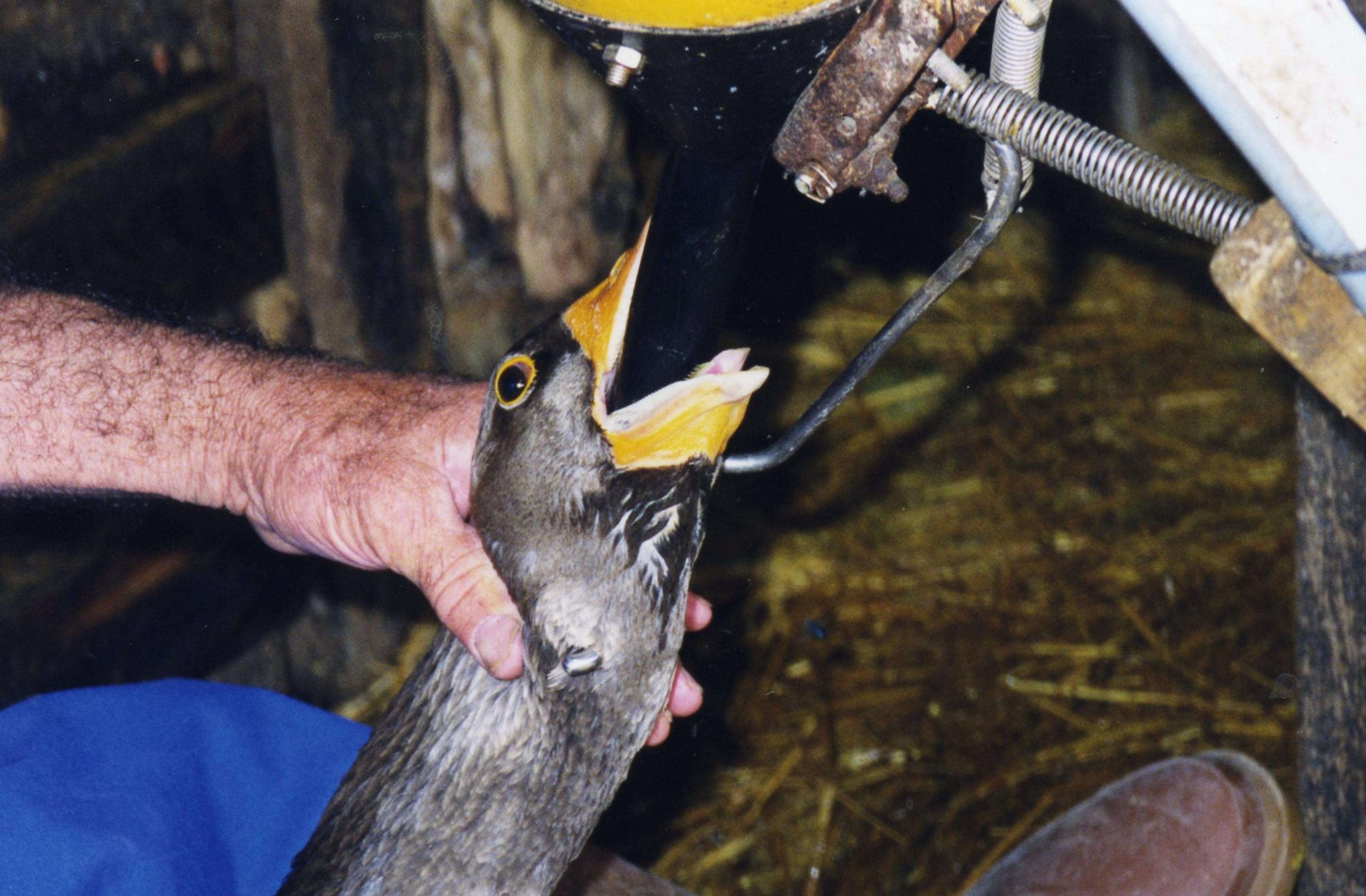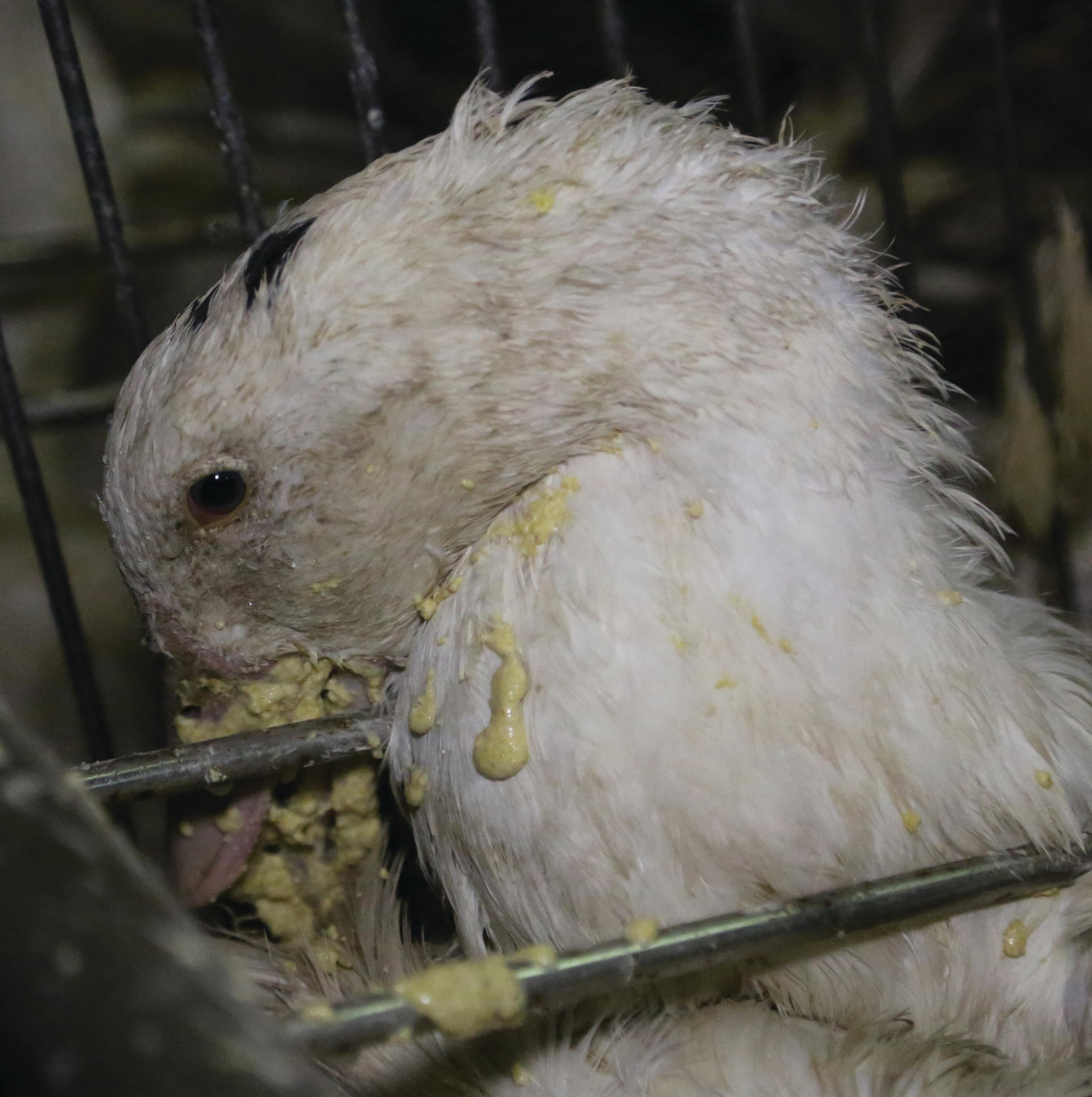Why foie gras is so cruel – and what you can do about it
By Chloe Pate, scientific and policy officer for hens, RSPCA

I still remember the first time I saw footage of ducks being force-fed to make foie gras. It stopped me in my tracks.
Foie gras is often described as a ‘luxury food’, but behind the glossy menus and packaging lies a reality of pain and suffering for ducks and geese.
That’s why I want to share why this so-called delicacy is so cruel – and how, together, we can put an end to it.
What is foie gras?
The name literally means ‘fatty liver’ in French. It’s a pâté made by feeding ducks and geese until their livers swell up to ten times their natural size, with a fat content of more than 50%.
This is done through force-feeding. Birds are restrained and tubes pushed down their throats, sometimes several times a day. The idea that an animal is treated this way for a luxury food product is, to me, completely unacceptable.
In addition, many ducks and geese are confined to cramped cages or pens, unable even to stretch their wings. It’s heartbreaking to think of them living like this.
Is foie gras banned in the UK?
Producing foie gras has been illegal in the UK since 2007 – and it’s absolutely not permitted under the RSPCA’s higher welfare standards.
But here’s the problem: it’s still legal to import foie gras from countries such as France, Hungary, Bulgaria, Spain and Belgium.
This means foie gras continues to appear in UK restaurants, food shops and even online – despite the fact it can’t be produced here.
There have been calls to ban imports, but no law has been introduced yet.
Until then, the power is in our hands. Every time we refuse foie gras, we send a clear signal that this cruelty is not acceptable.
Why foie gras is cruel
Ducks and geese are sensitive, intelligent animals. They naturally love to forage, swim, explore and stretch their wings. But foie gras production denies them all of this.
- Force feeding causes their livers to grow so large they stop working properly. This makes birds weak, distressed and very ill
- Confinement in tiny cages or pens prevents them from turning around, standing tall or behaving naturally
- Poor living conditions like hard, slatted flooring, can cause painful foot injuries, while near constant darkness adds to the birds’ suffering.
For me, it comes down to this: foie gras reduces animals to nothing more than the size of their livers, ignoring everything else about their lives and needs.
That’s why animal welfare organisations around the world continue to call for bans on force-feeding and tighter restrictions to protect ducks and geese.
Can foie gras be ethical?
Some producers in California claim to make ‘ethical foie gras’ by allowing birds to feed naturally rather than force-feeding them.
On the surface, this might sound like progress. But as a welfare scientist, I know we need to ask tougher questions:
- Do the birds have access to open water to swim and preen?
- Are they able to roam freely and express natural behaviours?
- Are they kept in environments that meet their physical and emotional needs?
- And as traditional duck foie gras only uses male birds, what happens to the females? If they’re culled at birth, is this done humanely (in a way that doesn’t cause them pain and distress)?
Without clear answers to these questions, foie gras still falls short of acceptable animal welfare standards.
What you can do to help
Here’s how each of us can play a part in ending this cruelty:
- Say no to foie gras. Avoid buying or eating it. There are plenty of tasty alternatives, such as mushroom pâté
- Speak up. If you see it on sale in a shop or on a restaurant menu, let them know how you feel. A polite message can spark change.
- Spread the word. Talk to friends and family about why foie gras is cruel. Awareness is one of the most powerful tools we have.
A kinder future for ducks and geese
Foie gras is sold as a delicacy, but behind it lies a farming system built on cruelty. By rejecting it, we show that compassion and animal welfare matter far more than outdated traditions.

“Every choice we make helps. By saying no, speaking up and sharing the truth, we can reduce demand and protect ducks and geese from suffering.”
Together, we really can make foie gras history.
Frequently asked questions
How does buying foie gras affect animal welfare?
Every purchase supports the system that produces foie gras. Reducing demand is one of the most effective ways to prevent cruelty. By choosing alternatives and refusing to eat foie gras, consumers can help remove the market, at which point there’ll no longer be a reason for it to be made.
Are there alternatives to foie gras?
Yes! There are many other types of pâté, as well as lentil and nut-based spreads, which make excellent alternatives.
Why is public awareness important to bringing foie gras production to an end?
Consumer awareness drives change. The more people understand the cruelty behind foie gras and choose alternatives, the harder it becomes for producers to continue these practices.
Tuesday 30 September 2025